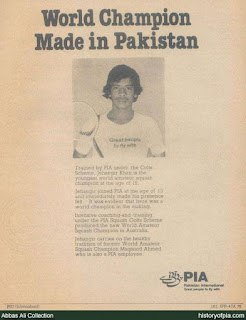IN DEFENCE OF 'CORRUPTION' (Dawn, Friday, September 10, 1993)
Dawn, Friday, September 10, 1993
IN DEFENCE OF 'CORRUPTION'
By Adil Ahmad
Talk
about corruption and accountability has been fashionable for quite a while in
our very fashion conscious society. Everybody talks about corruption, and the
havoc it plays into our everyday lives.
The
cop, the taxman, the water-man, the electricity-man, the gas-man, the
phone-man, and every other official kind of man comes in for a lot of stick as
the 'aggrieved' pick daintily at caviar and sip all manner of exotic brews
brought in from distant lands. What exactly is it that they are talking about?
What is this 'corruption'? And if so many people feel so strongly about it,
then why is it so enduring?
In
the Chamber's Twentieth Century Dictionary corruption is variously
defined as 'to make putrid, to taint, to debase, to spoil, to destroy the
purity of, to pervert, to bribe'. One thing that immediately becomes very clear
from the above is the undesirable nature of corruption. The caviar picking,
brew sipping lot are indeed right in their condemnation. There is nothing in
the definition of corruption that would endear it to any civilized society. So
how has it become so
all-pervasive
that certain sections of society are actually lobbying for its
institutionalization? Has the 'rot' sunk so deep that we must now accept it as
part and parcel of our existence? Or is there some other explanation?
A
civil servant, on the usual condition of anonymity, opines as follows. “Power
corrupts. I used to hear this said when I was a little kid. It did not mean
very to me then. But now I have little kids of my own, and I love them, and I
want the very best for them. My position in government pays me 5000 rupees a
month. I can make a thousand times that amount given my job authority. I think
of how far my 5000 takes me every month. My wife is constantly on my case. My
children lead a wretched life, from their quality of education to the quality
of the air they breathe. My employers, the government, is not sympathetic to my
plight. In my working environment there are strong ethnic resentments and
conspiracies. The public automatically classifies me as corrupt the moment they
hear that I am a civil servant. I can see it in their eyes. They all think I
have a few millions stashed away in some Swiss account!”
It's
a no win situation he says. “There is no longer any job satisfaction given the
politicization of the service. So what am I doing here? I don't know! Maybe I
am on the verge of conversion. The million dollar question is whether I should
leave the service flat broke and with a clean conscience, or well heeled. The
conscience can take a backseat. With money in the bank everything will fall
into place. And I don't have to make my money off widows and orphans. In my
line of work the petitioners have got plenty of money to spare, and they will
gladly part with a handsome amount to gain my favor.”
Another
one bites the dust? Who could blame him if he did? He is disenchanted and
bitter with a system that puts his integrity to the test everyday of his life,
and offers in compensation a laughable remuneration given the cost of living,
and one which is grossly disproportionate to the responsibility and authority
of the job. The system is lopsided. We have lived with it for so long that our
entire approach to problem solving has become lopsided. Corruption is the great
equalizer. It is that dynamic free market force which puts the planes of demand
and supply in balance. The laws, procedures and policies have not kept pace
with the changing times. While we have squabbled and bickered over petty plots,
and ‘pajeroes’, and picnic parties, an entire generation has grown up as if in the
jungle.
While
the legislators have legislated for personal profit, society has degenerated
into near chaos and anarchy. The law of the jungle settles the issue. The
survival of the fittest is guaranteed. The traffic sergeant with eleven kids
will necessarily have a hungry look on his face. Why he has eleven kids is a
different story. But he is stuck with them now. And should I get stuck with him
I can expect no mercy.
But
why should I get stuck with him, or any other official looking man for that
matter? "They are every where. You cannot avoid these servants of the
public! The only place where you can be free of their influence is under a
banyan tree! Even there you can never tell. Tree tax, would you believe?!"
It
is true that in our society the urge to control has often prevailed entirely upon
the will to expedite. Lengthy, complicated procedures very high on form filling
and nepotism have enabled control by a few in the name of national interest.
Growth, modernization, and the move towards a sophisticated society have been
sacrificed at the alter of status quo. In such circumstances, corruption is a
great expeditor.
In
business, as also in life, time often translates to money. Hence, 'speed'
money. If you have worked it into your project cost you don't think twice about
it. The service you get in return is absolutely incredible. Also, you make a
friend for life since you both now share a secret! The way 'speed' money
whizzes around in our society makes for a system at once very efficient and,
for those not conversant with 'speed' budgeting, full of despair.
"You
pay a bribe once, and you are stuck with it for life,” says one irate God
fearing businessman. “Thereafter nothing will get done without a greasing of
the palm. One must be strong and resist the pressures of the bureaucracy.
Instead of budgeting for 'speed' money, I build in extra time into my
completion schedule. Good projects never lose, even if they take a little
longer coming on line. You outlast the system's patience, and when the official
looking men make a wrong move, you go for their jugular."
Well
said, and with feeling. But what of the members of the public who don't want to
wait? Who are prepared to cut corners, and who live by the doctrine of 'speed' money?
They are the ones who cause this cancer in society. Their mad dash, hell bent
for leather approach to free enterprise leaves a lot of old fashioned entrepreneurs
battered and bruised.
Chinese
wisdom has it that as long as you cannot forgive the next man for being
different, you are still far from the path to wisdom. I don't for a moment
believe the Chinese would condone the corrupt, much less forgive them. But then
the corrupt don't appear as any different from the rest of us. Even their
conscience is sometimes clear depending on their proficiency at
rationalization.
So
is Chinese wisdom attempting to tell us that the corrupt, the sinners, are also
human beings. Slightly warped, even demented human beings, but human beings
nonetheless, capable of receiving God's forgiveness? Capable of repenting and
turning a new leaf? That these very corrupt keepers of the national trust have
the training, competence and capability to turn this great nation around, and
take it into the twenty-first century ahead of the pack?
The
ranks of the corrupt must be cleansed in a manner that rehabilitates the
officer and makes him a useful, highly motivated servant of society. Someone
who can administer ten thousand fields, and yet remain contented with that one
measure of rice a day.
For
those amongst the public servants who need more than one measure of rice a day
to get by, a whole filed can be put at their disposal provided their
intelligence and sincerity of purpose result in high levels of productivity for
the balance number of fields in their charge.
The
masters, the public at large, the beneficiaries of the pubic servants' high
yield, are a very large hearted lot. In the present day scenario their large
heartedness is severely put to the test through repeated belt tightening caused
by a servant cadre that is increasingly untrained, unconcerned and unrepentant.
There
is plenty more Chinese wisdom to learn from, and the one which particularly
appeals to me says".... rather light a candle than complain about the
darkness." If corruption in society touches the individual, then the
individual must fight against it, effectively. Corruption in official circles constitutes
just the tip of the iceberg. To be rich and to lead a luxurious life in the
midst of pathetically impoverished, suffering humanity is the vilest form of
corruption there can be.
Legitimately
made fortunes cease to be the only criteria. The manner in which these fortunes
get spent decides the status of the individual in the eyes of society. Each one
of us, irrespective of our employment status, is guilty of corruption at some
point in our lives. It is our God given ability to rethink a mistake, and chart
a new course, which makes for optimism and hope.
I
cannot resist quoting one last pearl of Chinese wisdom that puts into clear
perspective the virtues of a corruption free society. "... He who does not
lose command of himself lives on. He is not effaced by death but has eternal
life."




Comments
Post a Comment